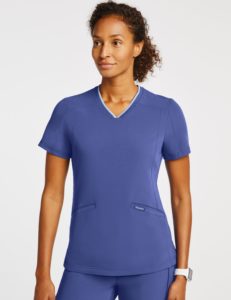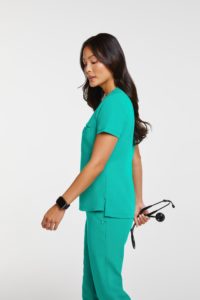
How To Clean Scrubs The Right Way To Deeply Wash and Disinfect Them
Be it your favorite pair of jeans or most treasured sweater, keeping your clothes clean is a chore that we all have to deal with regularly. It can be time-consuming, and it’s not exactly what you’d call fun. But if you’re a medical professional who has to wash your work scrubs daily on top of that? Well, that’s a tall order.
We know we’re speaking to the choir here when we say clean scrubs are essential for a safe healthcare environment. This is especially true when you run into bacteria and other contaminants daily. If you’re unable to wash your uniforms at an onsite facility at work, you’ll need to know how to effectively clean and sanitize your scrubs at home.
Read on for some tips to help you with this daily maintenance.
What you’ll need to wash your scrubs

If you’re wondering how hospitals wash scrubs, you might imagine a process that follows a specific deep-clean regime. And, while washing scrubs at home may not be as intense, they still need to go through a more thorough cleaning process than your regular clothing. You need to know how often to wash your scrubs, too. The short answer? A lot.
The tools you need to achieve this task include:
Heavy-duty detergent
As your most essential tool, you’re going to need plenty of heavy-duty laundry detergent to keep those scrubs clean. Household brands that you find at local supermarkets or online retail giants will do the trick.
White vinegar
Another household item that you’ll find at your local supermarket, white vinegar, works surprisingly well for keeping your scrubs in good shape and acts as a natural softener, too.
Disposable gloves
This one is pretty self-explanatory. Suppose you want to know how to hand wash scrubs safely, especially if you’re using heavier-duty cleaning solutions. In that case, protecting your hands is crucial.
Heavy-duty disposable rubber gloves will keep your skin from coming in contact with undiluted bleach and other harsh chemicals.
Additional cleaning supplies
You’ll sometimes notice, heavy-duty detergent isn’t enough. Occasionally, you’ll need to use something like chlorine bleach or pine oil disinfectants to remove more stubborn stains or more dangerous pathogens.
With these cleaning solutions, it’s essential to know what fabric they work best on and how to use them safely in the wash.
A washer and dryer
Want to wash your medical scrubs at home properly? Then you need a washer and a dryer, as they’re the only tools with enough force to efficiently clean your uniforms. They can dry scrubs quickly, too.
Care instructions for your medical scrubs
If you’ve ever read the care tag on any garment, you already know this one. Different fabrics require specific washing methods and sometimes additional care, too. Scrubs are no different. Using the wrong cleaning solution during an incorrect wash cycle, or water that’s too hot, can wear down your uniforms significantly quicker.
Look for the care tag inside your scrub shirt or pants, and read the washing instructions carefully before washing.
How to wash 100% cotton scrubs

Do scrubs shrink? If they’re 100% cotton, they can.
Like all organic weaves, cotton scrubs require a little extra love and care to maintain their strength and color. And even though cotton scrubs do share similar qualities to regular cotton tops and pants, if you’re wondering if you can wash scrubs with other clothes, the answer will still be no.
To wash cotton scrubs:
- Turn the scrubs inside out to protect their color or any antimicrobial finish they may have. Cotton scrubs can bleed their color at the wrong water temperature, and the finish can rub off or show signs of pilling when exposed to too much friction.
- Once you turn them inside out, wash your cotton scrubs with cold water and heavy-duty detergent. Cold water prevents the fabric color from bleeding, while detergent gets those scrubs clean.
- In the “rinse” section on your washing machine, add a half cup of distilled white vinegar to soften your uniforms. This will help keep you comfortable during your shifts.
- Once washed, tumble dry your cotton scrubs on the lowest setting. If the heat setting is too high, cotton scrubs can shrink and lose their color. If you’re worried about shrinkage, you can also hang dry them for the first wash to be on the safe side. The same goes for other items, too, like lab coats.
How to wash polyester-cotton blend scrubs

More often than not, you’ll find scrubs made of a polyester-cotton blend instead of 100% cotton. Or, you’ll find specialty fabrics like Jaanuu’s proprietary FUSEryx™ and SPINryx™, both designed for easy cleaning and durability.
For example, you can find the FUSEryx™ option in our men’s relaxed elastic waist scrub pants or the semi-fitted scrub pants. And you can find examples of the SPINryx™ blend in our women’s semi-fitted scrub top selection.
Otherwise, to wash your polyester-cotton scrubs:
- Turn your scrubs inside out, as usual. While not as crucial as with cotton scrubs, it can still help prevent bleeding and protect detailed fabric features.
- Wash your scrubs with heavy-duty detergent and warm water, not hot. Hot water can still wear down your poly-cotton blend.
- Dry your scrubs on a medium-heat cycle. You can also air dry them for the first time for extra protection.
How to disinfect scrubs

Sometimes, in addition to cleaning your scrubs, you’ll need to disinfect them from pathogens, too.
Methods for disinfecting vary depending on the fabric weave and the kind of contaminant exposure, but here are some general, home-friendly tips:
- Always wear disposable gloves. The less your skin comes into contact with cleaning materials, the better.
- Use chlorine bleach to disinfect white cotton scrubs, but never pour it directly onto the fabric of your white scrubs themselves, and be very careful while using it. Instead, pour it into the bleach dispenser in your washing machine, or dilute it with water before adding it to your wash cycle.
- Add pine oil at the beginning of a warm wash cycle to disinfect all other non-cotton scrubs. You’ll need at least an 80% grade pine oil for it to be effective.
- Never mix your disinfectants unless specifically instructed to do so. This is another “preaching to the choir” moment, as if you work in healthcare, you’ll surely know why to avoid it. However, it bears repeating: mixing household chemicals can be hazardous if you aren’t familiar with the side effects.
How to deal with stains on scrubs

Do you have a particular type of stain you’re trying to treat? Here are some tips for stain removers.
Ink
This may not be the first stain you think of when you hear the word “scrubs,” but it’s a surprisingly common one that stems from pens and other items sitting in your scrub pocket. To remove ink stains, blot the stain with rubbing alcohol or hand sanitizer. It will break down the dye and allow you to finish up the rest via a regular wash cycle.
Blood
This is another standard stain. To remove dried blood, soak your scrubs in cold water before rubbing heavy-duty detergent over the bloodstain to break it down. Follow your usual wash cycle.
Bodily fluids
This category includes things like vomit, urine and feces. With these stains, make sure to remove solid bits by scraping them away with a disposable object first. Next, treat the remaining stain with a cold water wash and heavy-duty detergent. You can use baking soda to reduce the smell, too.
Deodorant
We’ve all seen stains like these on scrub tops, and they can build up over time if not dealt with properly. To remove deodorant stains, use a mixture of baking soda and water.
Some extra tips

With that last bit of info out of the way, we have a few tips on keeping your scrubs clean and in excellent condition outside of a healthcare facility:
- Have a separate laundry hamper for your dirty scrubs at home to keep them from coming into contact with your regular clothes.
- Clean scrubs that are currently not in use should be hung up in plastic garment bags inside your closet to keep them in a pristine, sterile condition for use on your next shift.
- You can make your scrubs last longer by mending the minor repairs yourself; a simple needle and thread to fix small rips, fraying edges or loose badge hoops will do.
- To cut back on accidental food stains, avoid eating messy meals in your scrubs.
For an additional selection of easy-to-wash scrubs that you can buy, check out Jaanuu’s selection of women’s relaxed scrub tops. Happy washing!